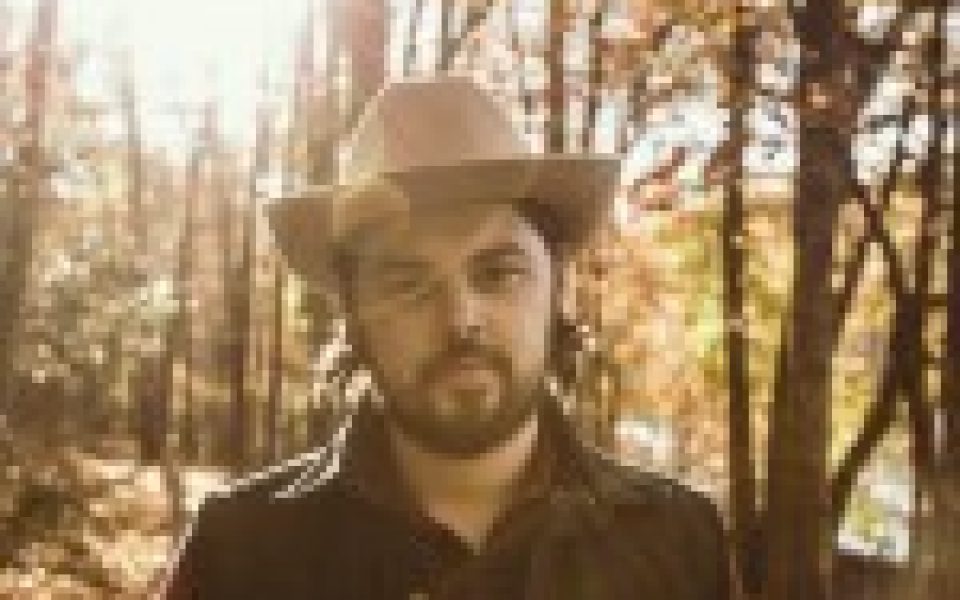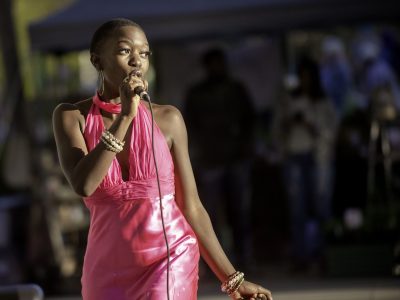by Jordan Green
This is not the way the story of the lonesome troubadour is supposed to go. And that’s for the best.
With a half-dozen well regarded but largely ignored albums full of authentic folk-country songs in the mold of Steve Earle and Townes Van Zandt, Winston-Salem’s Caleb Caudle could have found himself in a creative eddy during a brief but dissolute sojourn in New Orleans in 2014. But he got sober, moved back to Winston-Salem and went back to work with renewed creative focus. Carolina Ghost, the album that came out of Caudle’s sessions at Fidelitorium Recordings in Kernersville with co-producer Jon Ashley, is the result.
Caudle marked the release of Carolina Ghost with a sold-out hometown show at the Garage in Winston-Salem on Feb. 25, and followed two nights later with a well-received concert at the Evening Muse in Charlotte. By the end of the weekend, Carolina Ghost was topping Amazon’s Alt-Country & Americana charts, alongside the Band’s Greatest Hits and the Waco Brothers’ Going Down in History. It could only help that Caudle received a rush of favorable press, including raves from Huffington Post, Aquarium Drunkard, Paste, CMT and Pop Matters, along with a thoughtful long-form piece by former Spin magazine editor Charles Aaron for the Bitter Southerner. And lest you think that it’s all music-critic hype, Caudle’s Facebook is bursting with testimonials, including one from a fan from Mobile, Ala. who calls Carolina Ghost his “favorite album of all time,” with the caveat that “a significant portion of my collection is obscure European metal.”
So on Sunday, on what was supposed to be his day off, Caudle found himself driving down to Athens, Ga. to pick up the second pressing of vinyl albums. It’s a good problem to have.
Sitting for an interview at a concrete table outside Krankies Coffee on Monday afternoon, Caudle has switched from coffee to Coca-Cola. He’s clearly pleased that the album has gained traction, remarking, “I’m just trying to enjoy it and not completely be a workaholic.”
Pre-sales on the record are strong in Richmond, Va., DC and Baltimore, where Caudle has solo shows lined up this week, and later this month he’ll take his ace backing band to South by Southwest in Austin.
Caudle forged a bond with guitarist Tommy Scifres, drummer Jack Foster and bassist Jordan Powers of Roseland — initially formed as a country side project to House of Fools — during a tour in which they shared billing a couple years ago and the band would join him onstage for five or six songs.
“At a certain point I was able to afford to take a band out,” Caudle said. “I didn’t steal the band; it just worked out that way. I don’t really know if Roseland is on hiatus or not. Those guys play together so well. I was like, ‘They would sound great on what I’m doing.’”
Caudle also brought in Greg Herndon to play Wurlitzer, piano and Hammond B3, Brett Resnick on pedal steel and Alex McKinney on dobro for the sessions at Fidelitorium Recordings.
The 11 tracks on Carolina Ghost soar with a kind of crisp clarity, putting Caudle’s resonant voice out front and every note of the dobro, guitar and pedal steel in the right place as the songs cruise comfortably over a restrained drum click. It’s traditional country with excellent musicianship and standout vocals of the kind that gave George Strait a stunning run of hits in the 1980s before Nashville country went to crap. It’s the kind of music that might come over the radio in a gentleman farmer’s pickup in Kentucky in the early ’80s during a slow roll down country lanes bracketed by tobacco fields.
In contrast to the pathos of George Jones or the rough outlaw stance of classic Waylon and Willie, most of the turmoil in Caudle’s music is in the rearview, as with the romantic insecurity of “Wasted Thursday” (“This afternoon is nothing less than lonely/ Yesterday was one long kiss goodbye”) or the dissolute living of “Borrowed Smiles” (“I used to stay out, I used to stay out every night/ I used to run my mouth and always try to start a fight/ And get out the way just in time for someone else to take the blame”). “Broken Hallelujah” better represents the album’s overall feeling of reassurance: “Second chance, oh second wind/ Whatever it takes to begin again/ Small reminder of what used to be/ I came home for more than a memory.”
Reflecting on the making of Carolina Ghost, Caudle says, “I wanted to make a really, really great sounding record. I had a more lo-fi sound in the past, but that wasn’t by choice. I really like to have the vocals out front, and I’m drawn to really strong singers, singers who belt it out. I’m really drawn to the soulful singers.”
At the age of 29, Caudle has seven albums to his name, both with his band the Bayonets and, since 2012, as a solo artist. As a teenager, he primarily listened to punk rock bands like the Clash.
He smiles when he thinks of the evolution he’s made from punk through rough-hewn folk music to this sparkling vintage of traditional country.
“I think it probably would have surprised my younger self,” he says. “When I step back and look at the simplicity of punk rock and the simplicity of country, it gets straight to the emotion. It’s trying to strip away anything from the song that gets in the way so it’s just exactly what you want.”
Like his alt-country peers John Moreland and Aaron Lee Tasjan, Caudle says he carries a DIY ethos into the music business. Despite the plaudits and the full houses at shows these days, he doesn’t anticipate changing up his approach any time soon.
“These three dudes are working hard,” Caudle says of himself and his peers. “We’re going on the road, making fans and shaking hands.
“We drive ourselves everywhere and print our own merch,” he continues. “People see what we do — the 45 minutes to an hour onstage — and think that’s it. That’s only 5 percent of the job. I kind of like to work. Me and John and Aaron all are from punk rock. You should see my living room now. There’s hundreds of packages spread over the room. You can’t even sit on the couch. I like to work. I’d probably be lost without it.”
Join the First Amendment Society, a membership that goes directly to funding TCB‘s newsroom.
We believe that reporting can save the world.
The TCB First Amendment Society recognizes the vital role of a free, unfettered press with a bundling of local experiences designed to build community, and unique engagements with our newsroom that will help you understand, and shape, local journalism’s critical role in uplifting the people in our cities.
All revenue goes directly into the newsroom as reporters’ salaries and freelance commissions.





Leave a Reply